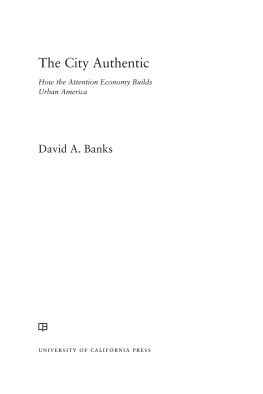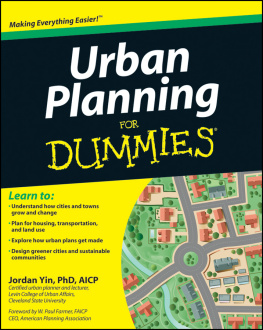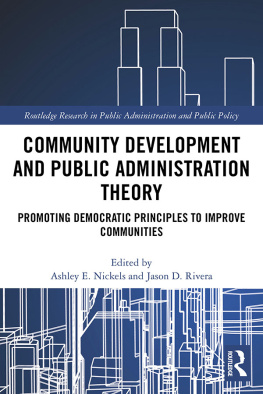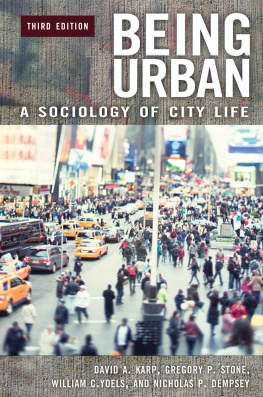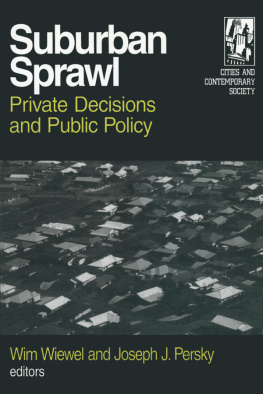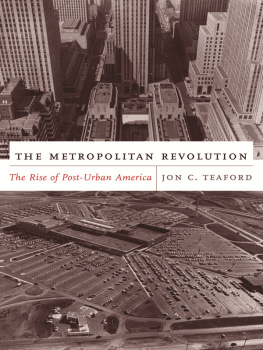First published 1985 by Transaction Publishers
Published 2017 by Routledge
2 Park Square, Milton Park, Abingdon, Oxon OX 14 4RN
711 Third Avenue, New York, NY 10017, USA
Routledge is an imprint of the Taylor & Francis Group, an informa business
New material this edition copyright 2001 Taylor & Francis.
All rights reserved. No part of this book may be reprinted or reproduced or utilised in any form or by any electronic, mechanical, or other means, now known or hereafter invented, including photocopying and recording, or in any information storage or retrieval system, without permission in writing from the publishers.
Notice:
Product or corporate names may be trademarks or registered trademarks, and are used only for identification and explanation without intent to infringe.
Library of Congress Catalog Number: 00-061528
Library of Congress Cataloging-in-Publication Data
Popenoe, David, 1932-
Private pleasure, public plight : urban development, surburban sprawl, and the decline of community / David Popenoe.
p.cm.
Includes bibliographical references and index.
ISBN: 0-7658-0708-4 (pbk.)
1. Metropolitan areasUnited States. 2. Sociology, UrbanUnited States. 3. Community lifeUnited States. 4. Social problemsUnited States. I. Title.
HT334.U5 P66 2000
307.76'4'0973dc21
00-061528
ISBN 13: 978-0-7658-0708-3 (pbk)
It is gratifying to see the degree to which issues of the urban residential environment have come to the fore in the American public debate since this book was written in the early 1980s. Perhaps because the Cold War is over and our economy is much stronger than it was at that time, social concerns once on the back burner are now subject to serious national consideration. Ask any American today about the public issues of greatest importance and the decline of community, with its concomitant moral decline, invariably looms large. Not far behind are the social problems associated with modern urban and suburban development, ranging from personal isolation and loneliness through family breakdown to delinquency and crime.
Nothing has made these problems more vivid than the highly publicized incidents of school violence, incidents that have taken place not on the farm or in the urban ghetto but for the most part in metropolitan areas, especially suburbs. Americans still find it hard to believe that such incidents could be taking place in modern communities, residential environments that are widely believed to represent the achievement of the American dream. But, in fact, as examined and evaluated in this book, these communities are not especially well suited to meeting human needs or achieving human desires. And the validity of this view, not only unpopular but even iconoclastic twenty years ago, has gradually been confirmed by recent events.
Since the beginning of human history most people have lived their lives in small close-knit groupings where feelings of attachment were strong and moral codes could be upheld by informal sanctions. It is reasonable to believe that such communities are closely in tune with our intrinsic human nature. With urbanization, people have come to live in residential environments that have virtually the opposite characteristics. In place of a community of intimates is a community of strangers, and in place of informal sanctions is a removed system of formal sanctions. Families are small and often broken, neighbors no longer relate to neighbors, and a sense of community has all but vanished. Is it any wonder that people have become so worried about the moral situation of modern society?
Fortunately, new intellectual movements have come on the scene in recent years that point the direction to a better way of life. Foremost among these is communitarianism, an ideology that insists the good society is one where people have a rich community life with strong ties to others, rather than one in which a raw individualism takes over (private pleasure) and a sense of collective interest and common purpose is lost. That local community life should be revived, a central tenet of communitarianism, has now become infused in the thinking of both major political parties. Rejecting the highly centralized, top-down approaches of an earlier era, many of the current social policies of both Democrats and Republicans tend to favor locally based programs that seek to involve people in their home communities and rebuild local institutions.
Also, remarkably, urban sprawl recently has moved into the national debate. It is by no means clear what, if anything, Americans want to do about the issue. But many now recognize at least that there is a problem, and that uncontrolled urban development can be just as serious for human beings as it is for the natural environment. Governors have taken up the issue, the Sierra Club has made fighting sprawl its top environmental priority, and even national politicians are getting into the act. In the coming years it will be interesting to see what the nation is able to come up with in answer to the problems of urban sprawl.
In theory, at least, the general solution to urban sprawl can be found in another recently developed ideology called the New Urbanism. Advanced by a small cadre of architects and urban planners, this ideology promotes the establishment of neotraditional neighborhoods and communities that try to recreate the main features of earlier American small towns. In late 1999, according to an article in Time, some 100 neotraditional neighborhoods were up and running in American with an additional 200 on the drawing boards. One of the leaders of the movement is quoted as saying that the goal of New Urbanism is to build a public realm that will sustain the democratic life. Another has said, this idea sells because conventional suburbia failed to deliver on its lifestyle promises. Although many New Urbanists may be unfamiliar with Private Pleasure, Public Plight, in fact they are following most of the guidelines put forth in the books final chapter, guidelines that seek to generate a tighter social fabric and a stronger public sphere.
Yet it remains doubtful that such efforts can be promulgated widely enough to have a serious impact. What most Americans still have not accepted is the necessity for strong planning of the urban physical environment. Despite the fact that physical planning is an important and time-tested role for the public sector, the idea of governmenteven local governmentplanning has increasingly been dismissed in recent years. Especially in the area of urban development, as indicated by a do-your-own-thing mentality and a worship of the automobile and wide-open living spaces, the traditional American inclination toward libertarianism appears to remain strongly imbedded in our national psyche. This inclination can only be reinforced by our increasing social and cultural diversity, and by the growing heterogeneity of our residential environments.
The traditional American small town required little formal planning, although even there the degree of informal activity in pursuit of collective goals was often quite remarkable. But large urban areas do require central direction if they are to result in something that benefits us all, and in this America has fallen down badly. Although many now believe that the European welfare states have overreached in certain respects, few Americans return from a visit to Europe with the feeling that European residential communities arent superior to ours in numerous ways, especially in their high level of public amenities and services. In the area of urban planning, as this book points out, there can be no doubt that the United States still has much to learn from the European experience.


